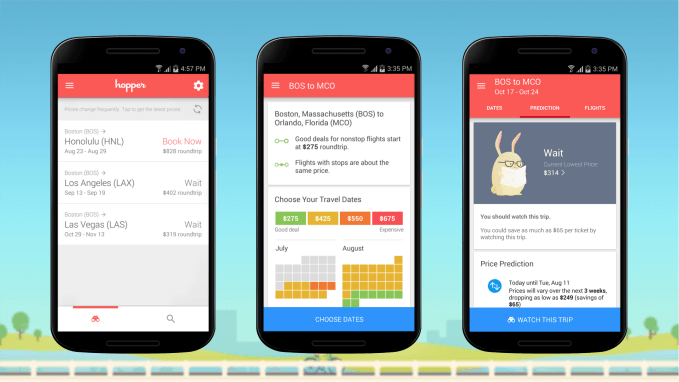To wait or not to wait? Hopper takes the guesswork out of flight purchases

Hopper uses a huge database of historical airfare data and daily sweeps of prices across multiple sites to predict future prices.
Hopper is an airfare prediction app that has been downloaded over 20 million times since it debuted in 2015[i] and has raised over $80 million in funding[ii]. Airfare price prediction and ticket sales is a crowded space, so how has the startup managed to garner so much attention? The answer lies in its relentless data-driven pursuit of the most accurate price predictions.
Hopper has spent the past several years accumulating an enormous database of airfare prices. They collect over five billion price quotes every day and have archived several trillion quotes in total.[iii] When app users input their desired destination and flight dates, Hopper uses a proprietary algorithm that accounts for both that historical data and current prices across a number of sites to predict future prices and recommend whether the user should “buy now” or “wait for a better price”.[iv] Hopper believes that most other fare prediction algorithms rely solely on historical data so their use of current prices as another input could be a differentiator.[v] The company claims that their predictions are 95% accurate.[vi] Consumers are always worried about paying too much for airfare, so this service is highly valued.
If a user follows Hopper’s recommendation to wait, they can sign up for alerts that will inform them when Hopper’s recommendation has shifted to “buy now”. This saves users the hassle of continually having to check the app. Hopper claims that 90% of bookings are the result of push notifications alerting users to “buy now” worthy prices.[vii] Additionally, Hopper will utilize the user’s flight search history to recommend great deals on related flights. For example, if you searched for a flight from Boston to DC on a particular weekend, Hopper might notify you that prices for two weekends later are significantly lower or that you can get a much cheaper flight by flying out of Hartford.

Users can purchase flights directly through the Hopper app. Hopper captures value through two primary sources: booking fees charged to users (~$5 per ticket) and commissions paid by the airlines.[viii] One of the challenges for Hopper is that users could avoid the booking fee by taking their recommendation and completing the transaction elsewhere. The company tries to address this threat in a few ways. The first is by making ticket purchases on Hopper extremely fast – it can be completed in less than 10 seconds.[ix] Given that so many users rely on Hopper’s push notifications to save them precious time finding them the best price, it makes sense that those same customers would appreciate saving time in the booking process. Second, some of the offers that Hopper communicates via push notifications are special offers provided directly by the airline to Hopper and can’t be found on other sites.[x] The third explanation seems to be the company’s favorite. As communications director Brianna Schneider says, “Our users have been fine paying the fee since the app saves them an average of $50”.[xi]
Hopper has clearly identified a consumer need for more consumer empowerment in the previously unpredictable airfare market. The big question is whether their data and algorithms can be the basis for a sustained competitive advantage. While Hopper has set the standard for airfare price prediction to date, there are large competitors in the travel space (e.g. Priceline/Kayak and Expedia) who could theoretically gather similar amounts of data and hire data scientists to develop effective algorithms. More recently, Hopper has started applying its price prediction algorithms to hotel bookings as well.[xii] So perhaps they will be able to leverage their analytical capabilities more broadly and become a company that consumers look to for price-predictions across many goods and services. Regardless of the specific products that they target, the task is daunting: to succeed Hopper must continue to predict the future better than anyone else.
[i] http://www.hopper.com/corp/announcements/hopper-fact-sheet
[ii] https://www.crunchbase.com/organization/hopper
[iii] http://www.hopper.com/corp/announcements/hopper-fact-sheet
[iv] http://www.travelandleisure.com/articles/hoppers-new-app-throws-down-the-gauntlet-for-flight-predictions
[v] http://www.travelandleisure.com/articles/hoppers-new-app-throws-down-the-gauntlet-for-flight-predictions
[vi] https://techcrunch.com/2016/12/15/hopper-raises-61-million-more-for-its-airfare-prediction-app/
[vii] https://techcrunch.com/2016/12/15/hopper-raises-61-million-more-for-its-airfare-prediction-app/
[viii] https://www.theringer.com/2017/5/30/16046920/travel-apps-services-next-vacay-scotts-cheap-flights-hopper-815a1f2f0592
[ix] https://techcrunch.com/2015/08/31/cheap-airfare-finder-hopper-hits-android-now-books-tickets-with-just-a-few-taps/
[x] https://skift.com/2016/12/15/contrarian-flight-app-hopper-attracts-61-million-in-series-c-financing/
[xi] https://www.theringer.com/2017/5/30/16046920/travel-apps-services-next-vacay-scotts-cheap-flights-hopper-815a1f2f0592
[xii] https://techcrunch.com/2017/10/25/hopper-expands-its-price-prediction-technology-to-hotels-initially-in-nyc/



Thanks for the post, PD! I was shocked to read that Hopper collects over 5 billion price quotes every day… what an enormous amount of data to track! The benefits to the consumer are clear– booking flights is always a hassle; there are so many different flight aggregators to choose from, some of which show prices from the other aggregators, some of which do not. I always end up having about five tabs open on my computer when I am searching for the best flight deals.
You raise a great point about platform disintermediation. There is really nothing stopping me from receiving the Hopper push notification to “buy now” and then simply booking it on a different site. Although some users are happy to pay the $5 fee for the convenience and the $50 savings, others will surely not be. I look forward to continue following Hopper to see how it does in the hotel space!
Very interesting post! “The company claims that their predictions are 95% accurate. Consumers are always worried about paying too much for airfare, so this service is highly valued.” I’ve always wondered whether it would be feasible for there to be a secondary hotel booking or airline ticket service. If a continue like Hopper can predict accurately when the optimal time to pay for a hotel room would be, couldn’t they snatch up the hotel rooms at that price and offer them at a slight premium for what they paid, yet still under the hotel’s reservation website?